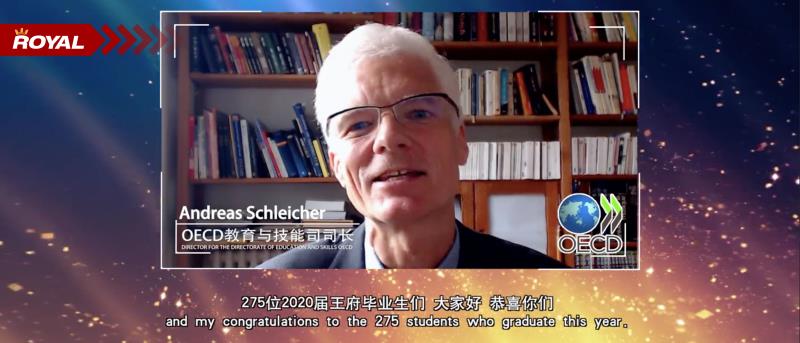Words of Encouragement from Mr. Andreas Schleicher, Director for the Directorate of Education and Skills OECD

My Warmest greetings to Beijing Royal School and my congratulations to the Class of 2020 students who graduate this year.
I know your studies were tough, but they have opened the whole world for you.
You can now join over 10,000 alumni from the Beijing Royal School and to choose from the finest universities all around the world.
But what is most important these days is Beijing Royal School has not just taught you something, but it helped you to develop a reliable compass and the tools to navigate with confidence through an increasingly complex, volatile, uncertain world.
That compass will be more important than ever. It will tell you that success in education nowadays is about identity, is about agency and is about purpose, is about building curiosity, opening minds, is about compassion, opening hearts, and is about courage, being able to mobilize our cognitive, social and emotional resources to take action.
And also it is going to be our best weapon against the biggest threats of our times.
Ignorance, the closed mind; hate, the closed heart; and fear, the enemy of agency. We live in this world, which the kind of things that are easy to teach and test and have also become easy to digitize, to automate.
The future is about pairing the artificial intelligence of computers with the cognitive of social and emotional skills and values of humans. It is going to be your imagination, your awareness and your sense of responsibility that will help you harness technology, to shape the world for the better.
These days information behind social media is sorting us into groups of like-minded individuals. They created virtual bubbles that often amplify our own views but leave us insulated from divergent perspectives.
They modularize opinions and they polarize our societies. That is why it is so important that you can think for yourself and join others with empathy, in world, in citizenship. That is why it is important that you have a strong sense of right and wrong and sensitivity to the claims others make on you and grasp of the limits on individual and collective action.
At work, at home and in the community, you need a deep understanding on how others live and different cultures and traditions and how others think whether as scientists or as artists.
Whatever tasks machines may be taking over from humans at work one day, the demands on our knowledge and skills to contribute meaningfully to social, to civic life, they always keep rising.
The growing complexity of modern living for individuals, for communities, for societies means that the solutions to our problems will also be complex.
In this structurally unbalanced world, the imperative of reconciling diverse perspectives and interests, in local settings but often with global implications, it means that you need to be good at handling tensions and dilemmas, striking a balance between competing demands.
Equity and freedom, autonomy and community, innovation and continuity, efficiency and open process. It is going to rarely lead to an “either-or” choice or even think of a solution. We could think of more integrated ways and recognize interconnection to our capacity to navigate ambiguity has become key.
Creativity and problem solving requires your capacity to consider the future consequences of your actions with the sense of responsibility and with moral and intellectual maturity, so that you can reflect on your actions in the line of experiences and personal and societal goals.
Perception and assessment of what is right or wrong, good or bad, in this specific situation, it’s always about ethics, asking questions related to norms, to values, meanings, and limits.
What should I do? Was I right to do that? Where are the limits? Knowing the consequences of what I did, should have I done it?
But graduation from school is not the end of education. It is just a beginning. You will need to learn every day in your life. And equally important, you need to be able to unlearn and to re-learn when the context, the situation changes. If you want to stay ahead of technological developments, you have to find number of qualities that are unique to our humanity, and that complement, not compete with the capacities we’ve created in our computers. Principal Wang and his teachers have given you the tools for that, now is up to you to use that.


